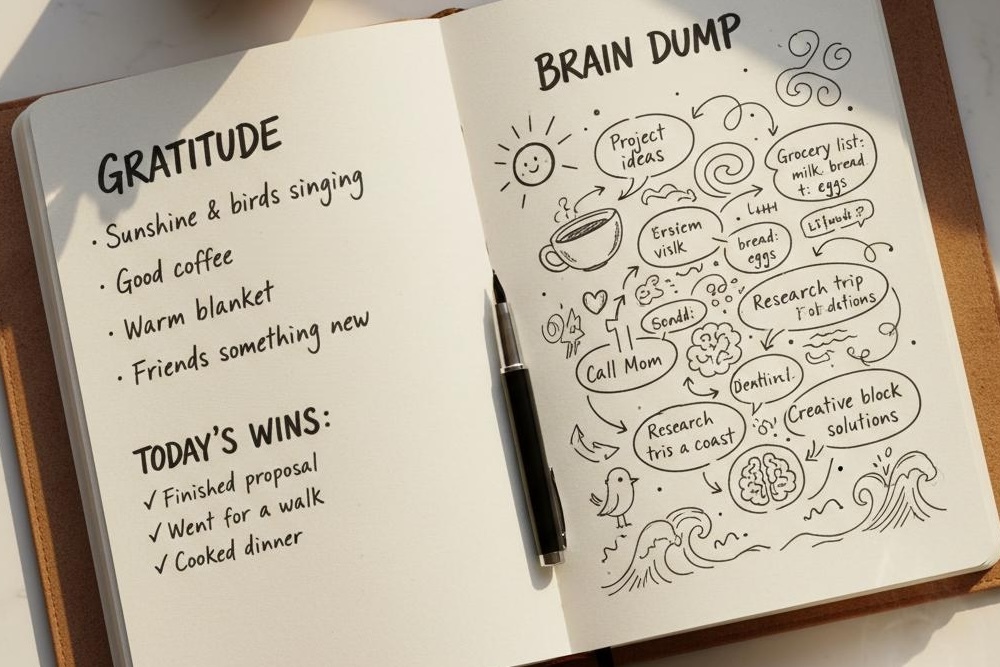How to Start Journaling in 2026: A Guide to Better Mental Clarity
Landon Bishop
2025-10-10
6 min read

In our increasingly connected world, finding moments of genuine clarity can feel like searching for a quiet space in Times Square. While technology has brought countless benefits to our lives, it has also created an environment where our thoughts rarely get the chance to settle. This is where the ancient practice of journaling emerges as a powerful tool for mental wellness, offering a pathway to clearer thinking and emotional balance that feels more relevant than ever in 2026.
The Science Behind Journaling and Mental Clarity
Research consistently demonstrates that regular journaling can significantly improve mental clarity and overall psychological well-being. Studies published in psychological journals show that expressive writing helps people process complex emotions and organize their thoughts more effectively. When we write by hand or type our thoughts, we engage different areas of the brain that help us make sense of our experiences and identify patterns in our thinking. The practice of journaling essentially creates a dialogue between our conscious and subconscious minds. By putting thoughts into words, we transform abstract feelings and ideas into concrete concepts that we can examine, understand, and ultimately learn from. This process helps reduce mental clutter and provides the space needed for clearer decision-making and problem-solving. Neuroscience research indicates that journaling activates the prefrontal cortex, the area of the brain responsible for executive functions like planning, decision-making, and emotional regulation. Regular activation of this brain region through writing can strengthen these mental muscles over time, leading to improved cognitive function and emotional stability.
Starting Your Journaling Journey
Beginning a journaling practice doesn't require expensive equipment or extensive preparation. The beauty of journaling lies in its simplicity and accessibility. You can start with nothing more than a notebook and pen, or use any digital device you prefer. The key is choosing a method that feels comfortable and sustainable for your lifestyle. Consider your natural preferences when selecting your journaling format. Some people find that writing by hand creates a more intimate and thoughtful experience, while others prefer the speed and convenience of digital journaling. Apps designed for journaling can offer features like prompts, mood tracking, and easy searching, but they're not necessary for an effective practice. The timing of your journaling sessions can significantly impact their effectiveness. Many people find morning journaling helps them set intentions for the day and clear their minds before tackling daily challenges. Others prefer evening journaling as a way to process the day's events and prepare for restful sleep. Experiment with different times to discover what works best for your schedule and goals.
Building a Sustainable Habit
The most successful journaling practices are built on consistency rather than perfection. Starting with just five minutes a day is far more valuable than attempting hour-long sessions that you can't maintain. This approach helps establish the neural pathways associated with the habit while keeping the commitment manageable. Setting realistic expectations is crucial for long-term success. Your journal entries don't need to be profound, grammatically perfect, or particularly insightful every day. Some days you might write about mundane details, while others might bring breakthrough moments of clarity. Both types of entries contribute to the overall benefits of the practice. Creating environmental cues can help trigger your journaling habit. Choose a specific location for your practice, whether it's a comfortable chair by the window or a favorite coffee shop. Having a designated journaling space signals to your brain that it's time to shift into reflective mode. Similarly, keeping your journal and pen in a visible location serves as a gentle reminder to maintain your practice.

Different Approaches to Journaling
Stream-of-consciousness writing involves putting pen to paper and writing continuously without worrying about grammar, punctuation, or coherence. This technique, sometimes called "morning pages," helps clear mental clutter and often reveals insights that might not emerge through more structured approaches. The goal is to let thoughts flow freely without judgment or editing. Gratitude journaling focuses specifically on identifying and recording things you appreciate in your life. Research shows that regular gratitude practice can improve mood, increase optimism, and enhance overall life satisfaction. This approach works particularly well for people who tend toward negative thinking patterns or who want to cultivate a more positive mindset. Reflective journaling involves examining specific experiences, relationships, or challenges in depth. This approach encourages you to explore the emotions and thoughts surrounding particular situations, helping you understand your reactions and identify lessons learned. Reflective journaling can be especially valuable during times of change or difficulty. Goal-oriented journaling combines reflection with forward planning. This approach might include tracking progress toward specific objectives, brainstorming solutions to challenges, or clarifying values and priorities. This type of journaling helps bridge the gap between self-awareness and action.
Overcoming Common Obstacles
Many people abandon journaling because they feel they have nothing interesting to write about. Remember that the value of journaling comes from the process itself, not the content. Writing about ordinary experiences can reveal patterns and insights that weren't apparent before. Even describing your current mood or physical sensations can provide valuable self-awareness. Perfectionism is another common barrier to consistent journaling. Your entries don't need to be literary masterpieces or contain earth-shattering revelations. The act of writing regularly, regardless of quality, provides the mental health benefits associated with journaling. Give yourself permission to write poorly, knowing that the process itself is what matters most. Time constraints often prevent people from maintaining a journaling practice. However, even brief entries can be beneficial. Writing a single sentence about your day or jotting down three things you noticed can help maintain the habit during busy periods. The goal is consistency, not length.
Maximizing the Benefits
To enhance mental clarity through journaling, consider periodically reviewing your past entries. This practice can help you identify recurring themes, track personal growth, and recognize patterns in your thinking and behavior. Monthly or quarterly reviews can provide valuable insights into your mental and emotional landscape over time. Combining journaling with other mindfulness practices can amplify its benefits. Taking a few deep breaths before writing or spending a moment in quiet reflection can help you approach your journaling with greater awareness and intention. Starting a journaling practice in 2026 offers a powerful antidote to the mental noise of modern life. By committing to regular written reflection, you're investing in your mental clarity, emotional well-being, and personal growth. Remember that the perfect journal entry doesn't exist, but the practice of journaling itself can transform your relationship with your thoughts and emotions, providing the clarity you need to navigate life with greater wisdom and peace.



